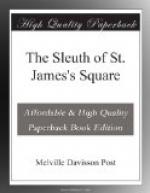“The monument is tremendous. One can’t avoid it. It’s always before the eye here, like the White Horse of Alfred on the chalk hill in Berkshire. All the roads pass it through this countryside. But every mortal thing that travels, motor and cart, must slow up around the monument.”
He stopped for a moment and looked at the white needle shimmering in the evening sun.
“But St. Alban’s greatest monument,” he said, “was the lucky sentence. It stuck in the English memory and it will never go out of it. One wouldn’t give a half-penny for a monument if one could get a phrase fastened in a people’s memory like that.”
Sir Henry moved in his chair.
“I often wonder,” he said, “whether the thing was an inspiration of St. Alban’s that morning on the deck of the hospital transport, or had he thought about it at some other time? Was the sentence stored in the man’s memory, or did it come with the first gleam of returning consciousness from a soul laid open by disaster? I think racial words, simple and unpretentious, may lies in any man close to the bone like that to be rived out with a mortal hurt. That’s what keeps me wondering about the words he used. And he did use them.
“I don’t doubt that a lot of our hero stuff has been edited after the fact. But this sentence wasn’t edited. That’s what he said, precisely. A hundred wounded soldiers on the hospital transport heard it. They were crowding round him. And they told the story when they got ashore. The story varied in trifling details as one would expect among so many witnesses to a tragic event like that. But it didn’t vary about what the man said when the Hun commander was swinging his automatic pistol on him.
“There was no opportunity to edit a brave sentence to fit the affair. St. Alban said it. And he didn’t think it up as he climbed out of the cabin of the transport. If he had been in a condition to think, he had enough of the devil’s business to think about just then; a brave sentence would hardly have concerned him, as I said awhile ago.
“Besides, we have his word that, after what happened in the cabin, everything else that occurred that morning on the transport was a blank to the man; was walled off from his consciousness, and these words were the first impulse of one returning to a realization of events.”
Sir Henry Marquis reflected.
“I think they were,” he continued. “They have the mark of spontaneity; of the first disgust of one grasping the fact that he was being threatened.”
The Baronet paused.
“The event had a great effect on England,” he said. “And it helped to restore our shattered respect for a desperate enemy. The Hun commander didn’t sink the transport, and he didn’t shoot St. Alban. It’s true there was a sort of gentleman’s agreement among the enemies that hospital transports should not be sunk.
“But anything was likely to happen just then. The Hun had failed to subjugate the world, and he was a barbarous, mad creature. England believed that something noble in St. Alban worked the miracle.




